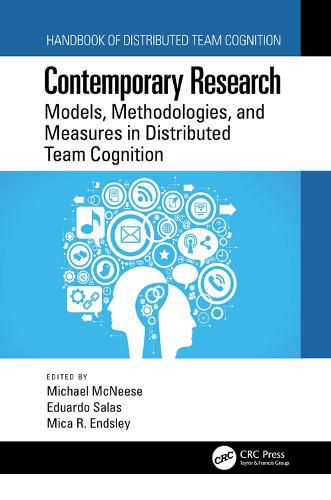Readings Newsletter
Become a Readings Member to make your shopping experience even easier.
Sign in or sign up for free!
You’re not far away from qualifying for FREE standard shipping within Australia
You’ve qualified for FREE standard shipping within Australia
The cart is loading…






The objective of Contemporary Research: Models, Methodologies, and Measures in Distributed Team Cognition is to advance knowledge in terms of real-world interactions among information, people, and technologies through explorations and discovery embedded within the research topics covered. Each chapter provides insight, comprehension, and differing yet cogent perspectives to topics relevant within distributed team cognition. Experts present their use of models and frameworks, different approaches to studying distributed team cognition, and new types of measures and indications of successful outcomes. The research topics presented span the continuum of interdisciplinary philosophies, ideas, and concepts that underline research investigation.
Features
Articulates distributed team cognition principles/constructs within studies, models, methods, and measures
Utilizes experimental studies and models as cases to explore new analytical techniques and tools
Provides team situation awareness measurement, mental model assessment, conceptual recurrence analysis, quantitative model evaluation, and unobtrusive measures
Transforms analytical output from tools/models as a basis for design in collaborative technologies
Generates an interdisciplinary approach using multiple methods of inquiry
$9.00 standard shipping within Australia
FREE standard shipping within Australia for orders over $100.00
Express & International shipping calculated at checkout
The objective of Contemporary Research: Models, Methodologies, and Measures in Distributed Team Cognition is to advance knowledge in terms of real-world interactions among information, people, and technologies through explorations and discovery embedded within the research topics covered. Each chapter provides insight, comprehension, and differing yet cogent perspectives to topics relevant within distributed team cognition. Experts present their use of models and frameworks, different approaches to studying distributed team cognition, and new types of measures and indications of successful outcomes. The research topics presented span the continuum of interdisciplinary philosophies, ideas, and concepts that underline research investigation.
Features
Articulates distributed team cognition principles/constructs within studies, models, methods, and measures
Utilizes experimental studies and models as cases to explore new analytical techniques and tools
Provides team situation awareness measurement, mental model assessment, conceptual recurrence analysis, quantitative model evaluation, and unobtrusive measures
Transforms analytical output from tools/models as a basis for design in collaborative technologies
Generates an interdisciplinary approach using multiple methods of inquiry